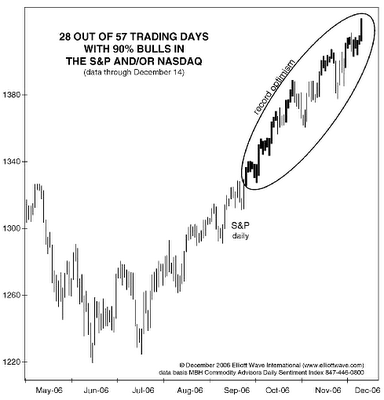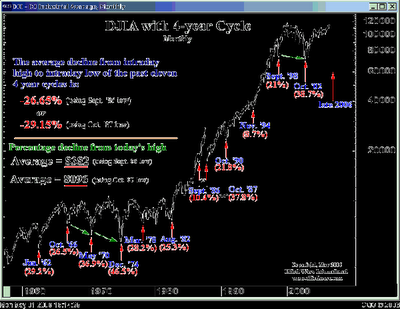

Sentiment surveys allow an investor to gauge the emotional enthusiasm of the market. The Daily Sentiment Index from MBH Commodities has been tracking the percentage of bulls and bears for 19 years. In mid-December, this survey recorded its highest long-term bullish reading ever.
More traders are bullish towards the S&P 500 (91%) than at the peak of the NASDAQ in 2000 (83%). Remember delusional investors were buying tech "ideas" in 2000. Now there is even more consensus that markets can only go higher (see below). This suggests a major correction.
February 03, 2007
Bubble?
Posted by
blogger
at
2/03/2007
![]()
![]()
Subscribe to:
Post Comments (Atom)



15 comments:
I'm not so sure this means a correction is imminent. The reason is, the P/E ratios are not outrageous like they were in the dot com bubble.
What I think it is: inflation.
New money enters the system via bank loans. What we see is all the items closely connected to banking: stocks, mortgages, financial institution salaries and bonuses are skyrocketing. This will eventually filter down to all commodities.
What we are seeing is that the rich are getting richer because they are the closest to the new money input spigot (they have money which must be managed by the bankers).
The reason American productivity is being destroyed is because people who create (financial people who just shuffle around money) next to nothing are being rewarded while the people who actually build things are not.
The excuse governments use to justify paper money is to balance the population vs. the goods and services. If the money didn't increase as the population rose, prices would have to come down because dollars per person would go lower.
The only fair way to inject new money into the system is to give every American citizen money at their 30th birthday. Whatever amount is necessary that year to balance the cash vs. the population. The current system rewards the people closest to the money (bankers) who of course, don't really produce anything except services to manage money.
It's all going to result in hyperinflation soon anyway and the dollar will collapse completely at which point a new system will have to be devised. Hopefully by then people will have learned, but I doubt it. Barring some complex system to balance money, which human beings will never be able to manage, using precious metals for money will have to do. At least it's not corruptible by some politicians whim.
The current system is doomed because politicians cannot raise taxes, not cut services without losing their jobs. So they borrow. Borrowing rewards non-production and that's what you end up getting. Ergo, bye bye American industrial and all other ingenuity.
It's not "the Jews". It's not the latest boogey man, the Chinese, it's paper money and the loophole it allows the government to not deal with the real problems facing us.
Here's an indicator I use to determine whether there is a stock or real estate mania going on.
My in-laws are the typical average joe that know nothing about investing. There have been 3 times where they decided they were missing the boat and had to buy.
March 2000: wanted to buy a tech stock fund. (I talked them out of it luckily).
Sept. 2005: bought a 2nd home apartment in Florida. Today in their complex of 150 apartments at least 50 are for sale.
January 2007: bought individual stocks (sbux, mo, toyota) for the first time in their 40 year savings history. Since the last time they wanted to buy tech, I assume that the bubble now exists in the non-tech consumer stocks.
They are most likely the last people to the party. Everyone can leave now. :(
Also, graphs like this are misleading.
Taking the recent top and bottom range of something and graphing it completely ignores the "percentages" involved which is all that matters.
The larger the gross values involved, the more insignificant the absolute movements are. 1/100000 is a lot less than 1/100.
By the way, the "gold as money" argument is pretty good.
The main reason is, it will just happen. It doesn't depend on government's decree.
Image some time in the future, near or far, when inflation has gone wild. Money loses 1% a day in value.
I'm a seller selling something. 10 people show up. 9 have paper dollars losing value every minute. 1 has gold coins or jewelry or whatnot which is GAINING value every minute.
Who is going to be put at the head of the line?
Notice that real assets will retain their value. But it's hard to carry a house or bags of pork bellies around to buy groceries. If we have massive inflation and have to be paid more, our mortgages will become very tiny monthly payments. Too bad for the lenders for whom I have the ultimate sympathy.
I read somewhere this is the longest we've ever gone without a 2% correction in the market - like 6 months straight
It's because everything bad which could happen is being covered up through the use of derivatives. With no more risk, where is there to go but up?
markets can remain irrational longer than bears can remain solvent or something like that
London calling.
http://mortgageresult.blogspot.com/2007/02/debt-torn-britain-sees-insolvency-climb.html
Although it is likely we will see a correction in the next few months, I don't buy that the "average Joe" is buying like in the dot.com era. The "average Joe" has NO money, and is tapped out on credit, Helocs, ARMS, etc. Plus salaries are not going up as fast as inflation (especially healthcare, energy, etc.). . .so it is the 20% of the money crowd who are investing, because there is simply no other place to stash all the cash. . .because I was a good saver, and always lived below my means, I find myself in my 50's as one of the 20%. . .every company I own has had good earnings, and almost all have raised their dividends in the past year. . .there are really two economies out there - the 80% and the 20%. . . the money flows (literally sometimes) from the 80% to the 20%. . .
"The market can stay irrational longer than you can stay solvent" John Maynard Keynes
Bottom line as long as money is being pitched, shoveled, or "invested" in an asset class it will continue to climb. Doesn't matter what the fundamentals, charts, or what Miss Cleo says.
Most of us here thought Real Estate couldn't continue to climb in 2001, 2002, 2003, 2004.
Not saying The Market can't take a header. But now a days nothing will surprise me. BUY GOLD
The key is to diversify. Never put all your eggs in one basket. Some good ETFs which are very aggressively managed. I like 50% cash, 15% gold, 25% equities (some growth) and 10% muni bonds.
I know this is beating a dead horse already but the whole economic ponzi scheme can be traced back to one source. The Federal Reserve. The founders of our Nation explicitly stated that congress was to control the nations money supply and that money was to be gold and silver. Allowing a private cabal of bankers to seize control of the money supply runs counter to everything the founders envisioned. Since the founding of the Federal Reserve (1913), the dollar has lost about 95% of its purchasing power.
JAFO
THE DOW IS A FRAUD.
everytime a company's stock does shitty, they pull it out of the DOW and insert another. So by default, it is manipulated up.
Correct. The Dow is a marketing tool. Most of the people that I know under 45, rich enough not to have to work, would not think of having money in Wall Street Casino. They mostly have Tresury Bonds, and they diversify with silver/gold, rental properties etc. The Dow has been going up since 1982 because of 401K money needing a place to go. Now that Boomers will start to need that money, and xers have little by way of replacement, the trend will be to find alternate ways to fund Wall Street. Ergo, you saw the push to "save" social security by giving some of it to Wall Street. I wonder if it was to really to save Social Security or Wall Street's Security.
To me the stocks/gold/inflation debate is far, far muddier than the housing "debate". To me every one of the posters above has a good point, and clearly their interpretations point in every direction. Since I am truly clueless in this debate, I am of the diversify/hedge opinion. I'd love to make the well-timed move of putting all of my eggs into the leveraged-bear-fund basket, but that move would be entirely speculative on my part, I wouldn't know when to make the move, and I'd doubtless get it wrong. So I'll just buy a little piece of everything instead (maybe including a shotgun and some bottled water in case of a really bad downturn) and likely most of the pieces will still be worth something after a particular asset crashes.
Post a Comment